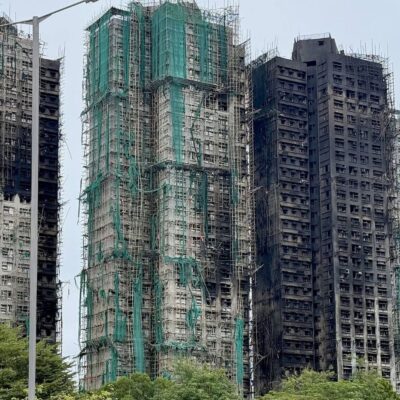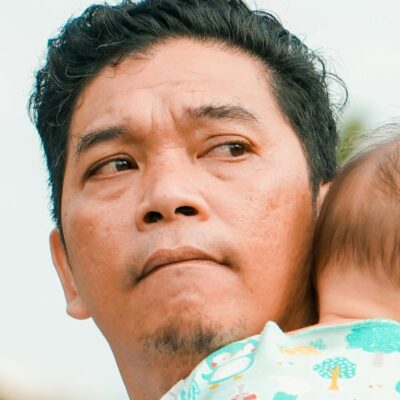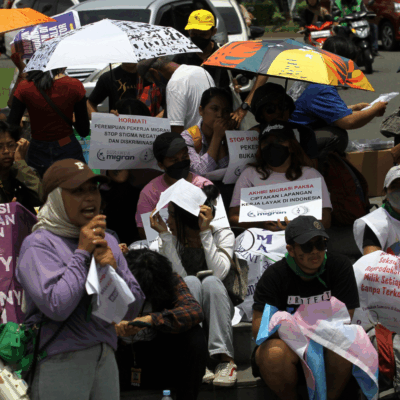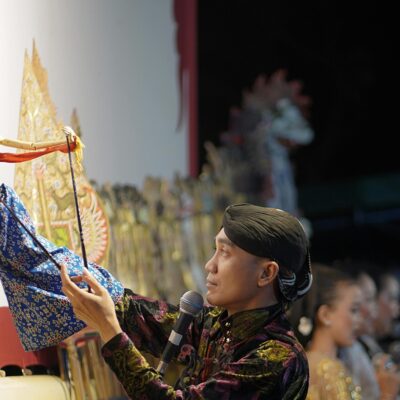In February 2025, at least five Indonesian students in Germany received private messages and phone calls from an official at the Indonesian Embassy concerning a planned protest against budget cuts and other government policies that would undermine the social support system. The protest was branded with the tagline ‘Indonesia Gelap’ (Dark Indonesia), resonating with widespread demonstrations in the country. The official urged the students to refrain from participating in the demonstration, expressing concern about its potential for international exposure. The organisers condemned this as an act of intimidation and a restriction on freedom of expression.
In March 2025, students involved in protests in Malang and Yogyakarta against a new Indonesian National Armed Forces Law (TNI law) reported direct intimidation and violence by policy and security forces. Student protests in Indonesia have intensified since 2019, following numerous anti-democratic measures undertaken by then President Joko Widodo (Jokowi) and the police and the issuance of many contentious laws without adequate public participation.
Many believe new President, Prabowo Subianto, inaugurated in October last year will adopt a tougher stance than his predecessor when it comes to stifling dissent, given his background as a former military man with a troubling human rights record. The recent passage of the TNI law, which provides stronger legal justification for expanding military involvement in civilian roles, could lead to a shrinking civil space even further, making it more challenging for civil society to oppose the government.
While this observation is valid, it should not be solely attributed to the leadership style of aspiring autocrats, contrary to what some observers suggest. Focusing on the personal traits of either Jokowi or Prabowo overlooks a deeper issue concerning a diminishing civil society in Indonesia and its ability to uphold democracy.
I argue that a major problem remains that leftist elements of civil society, those concerned with social justice and resource redistribution, in Indonesia lack the organisational capacity to unite and mobilise extensive support from their bases.
Organised left and democracy
Political economists such as Dietrich Rueschemeyer, Evelyn Huber Stephens and John D. Stephens have argued that the organised working class has played an historically significant role in enhancing democratisation and expanding rights protection. In capitalist societies, they have usually been the most materially motivated agent to effect greater political inclusion and resource redistribution.
In Western Europe, the working classes were successful during the post-World War Two era of rapid industrialisation when the state was reconstituting. This context allowed the working classes to organise stronger unions and leftist movements, enabling them to challenge both the state and capital.
However, in the Global South, capitalism has developed largely by relying on the role of the state, resulting in a more illiberal political environment. Cold War legacies have also empowered states to become more exclusionary toward labourers. This context creates unfavourable conditions for the working class to organise. In other words, the extent of social benefits and political liberalism enjoyed by citizens is primarily determined by the strength of trade unions in confronting the state and capital. This means that welfare policy and the protection of rights in the West are not a product of the goodwill of those in power or a reflection of the maturity of modern state institutions. Instead, they result from the historical class struggle of organised labour movements.
Some studies have shown that the middle class tends to swing back and forth between liberal and conservative positions, depending on what best serves to protect their socioeconomic privilege. In Thailand, for example, they supported democracy during the transition from an authoritarian regime up to the late 1990s, but in the 2000s, they began to be anti-democratic. More recently, reformist elements within the Thai middle class got behind the Move Forward Party, which is now banned for its challenge to military domination. Mainstream scholarship often neglects the crucial role of trade unions in the establishment of liberal democracy and the welfare system. These scholars tend to emphasise the role of educated middle classes as the true defenders of democracy due to their purportedly genuine liberal aspirations. This view lacks a historical basis and downplays the contributions of labour movements to democratisation. It is claimed that democratisation processes in the Third World and post-communist countries took place within the context where vibrant liberal middle classes existed alongside a notable absence of organised leftist movements.
Taking a closer look, democratisation in these countries, including Indonesia, is more a result of the shifts in the balance of power between the state and capital than pressure from the middle class. In many instances, the changing balance of power was an outcome of economic neoliberalism since the 1980s, which necessitated the removal of market-distorting factors, including centralised authoritarian governance, which then produced its own crises.
Organisational weakness of the left in Indonesia
With the lack of an organised left, democracy is more susceptible to authoritarian reversals or to being dominated by predatory interests. This tendency has also been observable globally in the last few years with the rise of right-wing politics.
The organised left in Indonesia has been weak since the 1965 communist massacres, which paved the way for the consolidation of Suharto’s authoritarian regime for the next three decades. The process of democratisation that began in 1998 was made possible only after Suharto could no longer maintain his power, partly due to internal friction among his military support since the 1980s. International pressure to establish a liberal market and a more open political environment as a condition for support during the 1997 Asian financial crisis also contributed to this shift.
What has led to the absence of the organised left in Indonesia since 1965? During Suharto’s New Order regime, the authoritarian state co-opted labour movements, along with other social organisations, following the destruction of the communist party. Trade unions, in the way they existed, relied heavily on state protection. This legacy remains influential, causing labourers to lack organisational capacity. The growing informalisation of labour has further weakened workers’ ability to organise.
As a result, despite having more freedom to build unions under democracy compared to the previous authoritarian era, labour movements remain an insignificant social force. Since 1998, the number of trade unions has increased exponentially from only one to more than 10,000 in 2020. However, the largest unions are still those linked to the New Order. The key to their survival and domination is that they continue to rely on patronage relationships with the ruling elites and maintain harmony with employers. Most of these conservative labour unions also dominate the main industrial sectors that they inherited from the New Order.
The radical left-leaning trade unions can only organise workers from subsidiary companies with a smaller workforce and more precarious employment status. Such a workforce is more difficult to organise. Other left-leaning organisations, in the form of political parties or fronts, some of them linked to the short-lived left-wing People’s Democratic Party (Partai Rakyat Demokratik, PRD), struggle to unite different leftist factions. They also continue to face internal conflicts and division. This fragmentation explains the new Labour Party’s poor performance in the 2024 elections. As the conservative factions of trade unions are dominant, the party’s direction also tends to align with predatory elites as a survival strategy.
Some key former figures in the PRD, including victims of kidnappings orchestrated by Prabowo, were appointed to ministerial positions. However, these appointments primarily advance Prabowo’s interests by enabling him to distance himself from his reputation as a human rights abuser while simultaneously domesticating the representation of so-called leftist elements within civil society.
The piecemeal legalistic approach of NGOs in Indonesia
In the absence of an organised left, NGOs focusing on human rights and law reform have become the dominant form of political opposition.
Their legalistic approaches to social advocacy have proven to be ineffective. This is evident from the failures of civil society to block various illiberal moves in the past few years. As a result, many problematic laws were enacted without significant challenges.
In 2019, social movements failed to prevent the revision of the KPK Law that crippled Indonesia’s anti-corruption body. In 2020, the Mining Law was also revised, allowing for the extension of mining permits without requiring the environmental restoration of abandoned sites. Meanwhile, the enactment of the 2020 Omnibus Law on Job Creation also significantly reduced labour rights and relaxed obligations on businesses, particularly concerning environmental assessments. In 2020, a major legal change took place in the Constitutional Court, which extended the appointment terms for judges. This change may align appointed judges with government interests, particularly in anticipating attempts to challenge problematic laws. The Constitutional Court, in recent years, has rejected most of the challenges to controversial laws.
Liberal civil society has also adopted a legalistic approach to respond to the Electronic Information and Transactions Law (popularly known as the ITE Law) which has been used by the government to repress critics and arrest civil society activists. Activists identified the core issue as the ambiguous wording of the law, which allows for loose interpretation according to the interests of the ruling elites and called for its reformulation. In 2021, Jokowi responded to this demand by proposing a revision to the law, but a new law issued in 2024 broadens the range of criminal categories and grants additional authority to police and government officials to close social media accounts.
During Jokowi’s first term, there were at least 203 defamation cases filed under the ITE Law. In his second term, this number more than doubled to 521 cases. This trend highlights how useful this law is to advance predatory interests, ultimately eroding civic space. With the latest version of the ITE Law, Prabowo has a more powerful tool to suppress dissent, likely increasing the number of people criminalised. Self-censorship in knowledge production will also become more common among mass media and universities. However, the trend of rising suppression is not solely attributed to Prabowo’s authoritarian leadership style; it is, instead, a logical outcome of the weakness of civil society in Indonesia, which primarily adopts a piecemeal legalistic approach.
Ineffective political opposition
Scholars and activists continue to emphasise the central role of reformist civil society in democratisation. They believe that Prabowo’s authoritarian reputation could serve as a catalyst for strengthening civil society movements, mobilising citizens to demand greater accountability and reform.
Some observers also overestimate the culture of oppositional politics that they believe has grown during the previous administration as a reaction to the government’s anti-democratic moves. Indeed, major protests have been held across various regions since 2019, demanding the government be more accountable and adhere to the rule of law. However, none of their essential demands were fulfilled, demonstrating that reformist civil society had limited influence in negotiating with the ruling elites. This was also the case in the 2024 Indonesia Darurat mass protests and the 2025 Indonesia Gelap and anti-TNI law demonstrations. Middle-class protestors could only employ conventional methods of social movements with unclear organisational structure and leadership and sporadic demands, limiting their capacity to pose challenges to the ruling elites.
Conclusion
Numerous problematic laws inherited from the previous Indonesian government are likely to be used by Prabowo’s government to further facilitate predatory interests and suppress dissent. Following the hasty enactment of the new TNI law other controversial bills that would expand state coercive power and impose greater restrictions on social dissent are also likely to be passed. Given this trend, it seems reasonable to conclude that civic space will continue to erode.
However, attributing the shrinking civic space solely to the leadership style of aspiring autocrats is misleading. The real issue lies in the lack of a strong civil society capable of defending democracy against authoritarian threats. Reformist elements within civil society have failed to achieve significant change due to a tendency to adopt a legalistic approach that is inadequate in challenging anti-democratic interests. They also exhibited little interest in organising social bases, preferring instead to maintain sporadic strategies for instigating social change.
Leftist trade unions are stuck in a situation where fragmentation seems to be their permanent feature. They have been unable to recover from the dark history of 1965 and restore their organisational capacity to mobilise the working class into a political force that can defend democracy and expand the protection of human rights for all citizens.
Consequently, the passage of numerous problematic laws seems unstoppable and civic space continues to shrink.
Author: Dr Abdil Mughis Mudhoffir. Alexander von Humboldt Research Fellow, Germany. Visiting Fellow at GIGA Institute for Asian Studies, Germany. Honorary Fellow at the Asia Institute, University of Melbourne.
Image: ‘Indonesia Gelap’ protest in Berlin, Germany, March 1. 2025. Credit: Rafiqa Qurrata Ayun.




